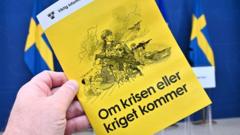In response to growing geopolitical threats, particularly following Russia's invasion of Ukraine, Sweden, Finland, and Norway are updating their guidance for citizens on how to prepare for potential crises, including war. Starting Monday, millions of Swedes will receive the newly updated pamphlet "If the crisis or war comes," which has been expanded to address contemporary concerns over national security.
Sweden's latest iteration of the pamphlet has been issued for the first time in six years, reflecting the increased sense of urgency expressed by the Swedish government. In announcing the changes, Civil Defence Minister Carl-Oskar Bohlin indicated that the country's former complacency required a wake-up call; now, they recognize that “there could be war in Sweden.” This marks a significant shift in the mindset of a nation that historically saw neutrality as paramount.
Simultaneously, Finland has unveiled new online guidance on how to prepare for crisis situations. Instead of distributing physical copies to each household, the Finnish government has opted for a more cost-effective and easily updatable digital format. Their brochure discusses steps the government would take in the event of an attack and reiterates that the country maintains robust self-defense capabilities—with a national awareness formed from its historical interactions with Russia.
Norway, on the other hand, has sent out 2.2 million paper copies of its preparedness guide, which includes advice on managing extreme weather and potential military conflict. The country’s guidelines contain practical suggestions like stocking up on long-lasting food supplies and essential medicines, such as iodine tablets in anticipation of a nuclear event. Authorities emphasize the importance of being able to sustain oneself and one’s family for at least a week during emergencies, factoring in environmental threats exacerbated by climate change.
For Swedes, the concept of a civil emergency guide is not new, as the first version dates back to World War II, and updates have been made during the Cold War. One crucial message highlighted in the current pamphlet asserts, “If Sweden is attacked by another country, we will never give up.” This determination captures the essence of the country’s evolving defense strategy in an increasingly uncertain world.
Despite being neighbors, the attitudes toward crisis preparedness vary significantly between these Nordic countries. Finland has consistently prioritized defense readiness, whereas Sweden is now working to rebuild its defense infrastructure after years of downsizing. This inertia has created a sense of urgency among Swedish citizens, prompting many to reassess their personal safety and preparation strategies.
Perspectives within Sweden range broadly. For instance, some citizens like economist Ingemar Gustafsson feel calm about the situation, indicating that the guidance is helpful but doesn’t inspire immediate concern. In contrast, others, such as younger Swedes and those with connections to Finland, exhibit more anxiety regarding the implications of the current geopolitical landscape.
Amid this evolving discourse on self-preparedness, experts highlight practical challenges in implementation—especially in urban areas, where space constraints can make sufficient storage for food and supplies a logistical issue. These nuances underscore the complexity of preparing for crises in an interconnected modern society, where individual readiness can significantly contribute to overall national resilience.


















